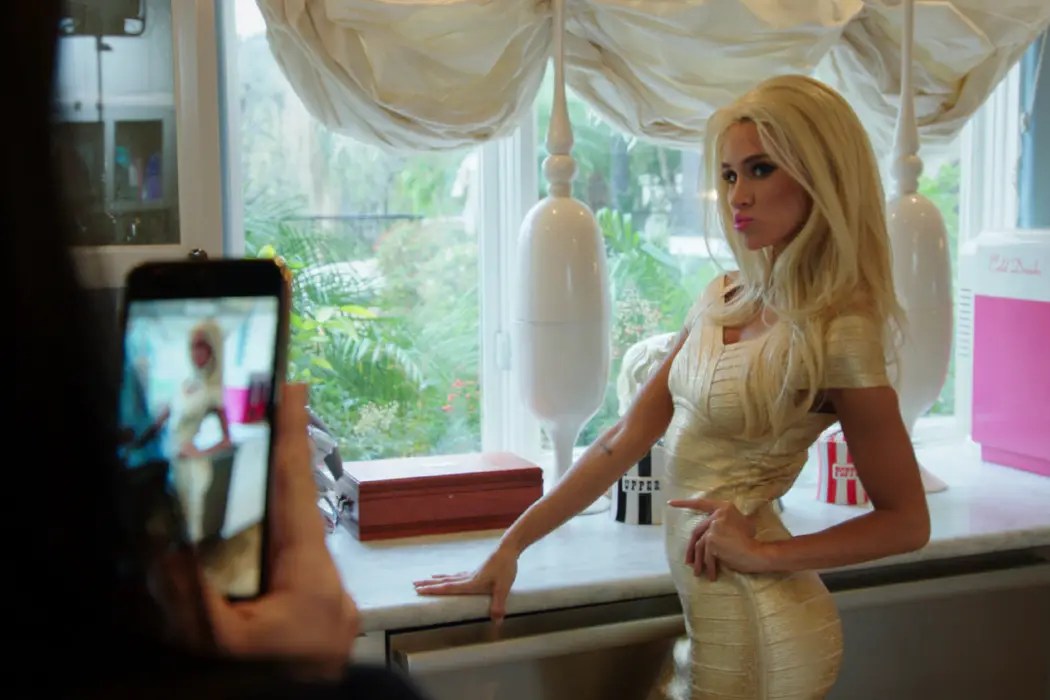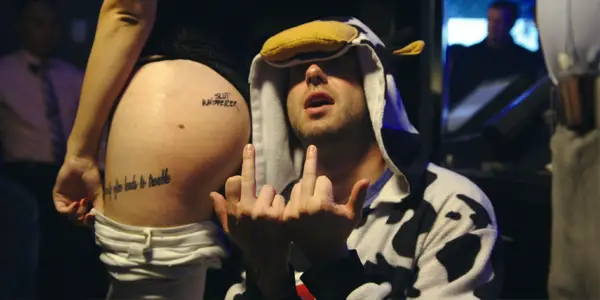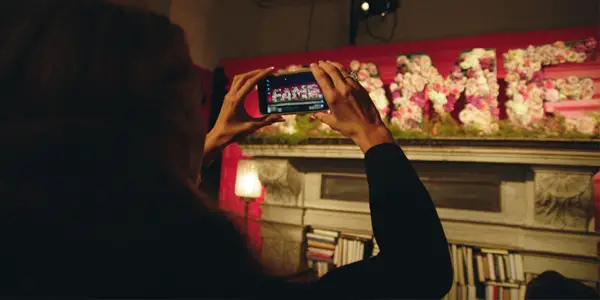THE AMERICAN MEME: The Fleeting Nature Of Fame Awaits

Alex is a 28 year-old West Australian who has a…
The title The American Meme might initially confuse viewers who click upon its thumbnail; those expecting a documentary dissecting the recent trend of irony posing and how society’s current need to reduce every news item or major event into a joke is having a negative impact, Bert Marcus’ latest film might disappoint. It’s the sort of title that people might just assume is one feature-length vine compilation, and in that regard, they might not be disappointed with this new Netflix original – it’s quick, fleeting and contains a series of dated social media stars acting out for our unwavering attention.
We have long departed from more simple times, one where the biggest name on Twitter was Ashton Kutcher, and Facebook was actually used to catch up with school friends. Instagram is no longer just a platform to preserve family photos and glimpse at the life of beloved celebrities, it’s another avenue to become a star, to start a business, or to make money, and The American Meme attempts to document this new stairway to stardom.
By putting the spotlight on today’s social media influencers, exhibiting who they are, what they do, and what the pressures of having these vast online empires can do to oneself, Marcus crystalises the tried and true statement that, despite what it might look like in their latest Instagram story or Snapchat frenzy, money doesn’t mean happiness.
The Story of The “Slut Whisperer”
In a series of detailed profiles of influencers from each of the major social media apps (Vine, Instagram, Snapchat and Twitter), we meet DJ Khaled, The Fat Jew, Kirill, Hailey Baldwin, Brittany Furlan, Emily Ratajkowski, Paris Hilton, and more, as they attempt to reason with their fame. They spin false legacies of “hard work and tears”, mere rhetoric that is just preaching to the crowd, which will most likely be lapped up by the disciples of these digitised churches.

Ratajkowski even tries to align her posts, which oscillate between flashing her skin or flashing a product with being a declaration of “fourth wave feminism”, drawing a straight line from hundreds of women burning their bras in the streets and facing real jail time in the 70’s to being an attractive woman today who bares all for thousands of thirsty followers.
Despite these being framed as ‘candid’ interviews, each one still feels like an extension of a brand, revealing that the face beneath the mask is merely another mask. It’s interesting that Kirill Bichutsky (who works with the Instagram handle “Slut Whisperer”) begins the film talking about how social media is all about “putting on an exaggerated truth”, because that’s all this feels like. Even in their interviews, most subjects hold their phones tight, capturing the transformation of technology as another extension of the body in a fashion that would make David Cronenberg proud.
The Power of Sex Tapes
Despite some brief moments of self-reflection (Kirill talks about his insomnia and dependence on alcohol), it’s Brittany Furlan’s post-Vine career arc that comes the closest to feeling “real”, as once the website which once gave her fame disappeared, so did most of her real prominence. As she works through a series of television deals, we watch her current relationship with Mötley Crüe drummer Tommy Lee begin, whose exes include other pop culture relics such as Pamela Lee Anderson and Heather Locklear, people who were once afforded a level of unprecedented fame and fortune, only to become the answer for when the crossword puzzle asks “who was this forgotten star of the 1990s?” and Jonathan Taylor Thomas doesn’t fit.

Meanwhile, Paris Hilton is positioned as the OG inventor of this new age of social media, cataloguing all of her major pop culture beats – the sex tape, the Carls JR. ad, the Surreal Life TV series and even the 2005 remake of House of Wax, which even by then, was capitalising on the tail-end of her notorious mainstream stardom (Remember the catchphrase “That’s Hot”?), a level of global stature which would be quickly overtaken by her former intern Kim Kardashian.
Unwittingly, the film posits her as someone who is desperately clinging to anyone/anything relevant that’ll have her, much like the brands who are willing to sponsor the Instagram posts of any major social influencer, who brag about figures up to $50K for a single post, even hinting that some bigger personalities (assumed the Kardashians) have a $1 million dollar pricetag for a single sponsored Instagram post (which are given the deceitfully clean title of organic advertising).
In one moment, Hilton looks back at old photos with her mother, a person as unnaturally plastic in appearance as her daughter, and when one catches her eye, she, without hesitation, notes that she’s gonna “take a picture of this for throwback Thursday”, without irony, without sincerity. She never feels fully human, rather a mannequin who miraculously became sentient. It’s hard to get past the baggage that surrounds Hilton’s character – the arrests, her privilege, her long history of being evasive with the press – and despite Marcus’ attempts at getting close, it never feels like she’s ready to drop the facade, or at this stage in this career, she’s possibly just forgotten how.
To someone who lives outside of this new world of social media interactivity, there’s several moments where I couldn’t help but laugh at how crazy this generation has become, like when the “Slut Whisperer” solemnly paints SLUT on his face, ready to spend the night splashing women with champagne, as his voiceover gravely questions who will visit his funeral. It nears satirical territory, a moment of humiliation that Andy Samberg would have to deal with in a sequel to Popstar (that we’d get if the world was a better place).
Time and Time Again
A late appearance from Dane Cook is well placed, as he was one of the first celebrities to build an audience through his online presence (a personal website and Myspace), but it fails to note how frail and unstable that demographic was, resulting in the industry practically chewing him up and spitting him out. Much like Hilton, he is doomed to remain a reminder of an earlier era, unlike some of the comedian contemporaries that he began with (such as Bill Burr and Dave Attell, who show up briefly in some archive materials). Hilton and him are used as signs of what’s to come for the younger interview subjects, even if they don’t know it yet.

Following their lead, The Fat Jew’s time in the sun has started to fade, struck down by a number of legitimate (and proven) complaints of plagiarism. A particularly annoying segment features him and Ratajkowski trying to justify plagiarism, noting that it’s just a natural notion of this millennial generation, and not something that is incredibly lecherous and should be condemned whenever revealed.
It seems to be an opinion sourced from a place of survival, rather than one of intelligent thought. One very telling moment is when the Fat Jew (aka Josh Ostrovsky), with a straight face, states that he has an army of interns who scour the internet for content for him to merely repost, because it forces us to ask the ultimate question; what is his talent, beyond being the face of a content aggregator? If he can be famous, then what stops anybody at this stage?
As the bar for being famous is at its lowest rung right now, it’s survival of the fittest at this stage to stay popular – it’ll be interesting to see how dated this documentary feels within the next few years as these current kings of social media battle for relevancy when hundreds of new competitors pour online everyday, hoping for their swift shot at success.
The American Meme: Conclusion
I respect the attempts by Bert Marcus to try and humanise these people with The American Meme, but I think, indirectly or not, his work ultimately has revealed just how this new type of celebrity lifestyle has created an indefinite state of emotional detachment for both parties – the celebrities and the audiences that keep them alive.
As a movie, it’s a slick and polished production, presented in an accessible matter which’ll click with its target audience. Anyone outside of that teenage demographic will be left rather annoyed, though, not by Marcus’ talents but the talents within the documentary itself. Older audiences will agree with The Fat Jew when he muses that “The age of the digital influencer is going to crash”; well, judging by the state of things, lets hope it’s sooner rather than later.
What do you think of the current state of social media? Let us know in the comments!
The American Meme is now available on Netflix.
Does content like this matter to you?
Become a Member and support film journalism. Unlock access to all of Film Inquiry`s great articles. Join a community of like-minded readers who are passionate about cinema - get access to our private members Network, give back to independent filmmakers, and more.













